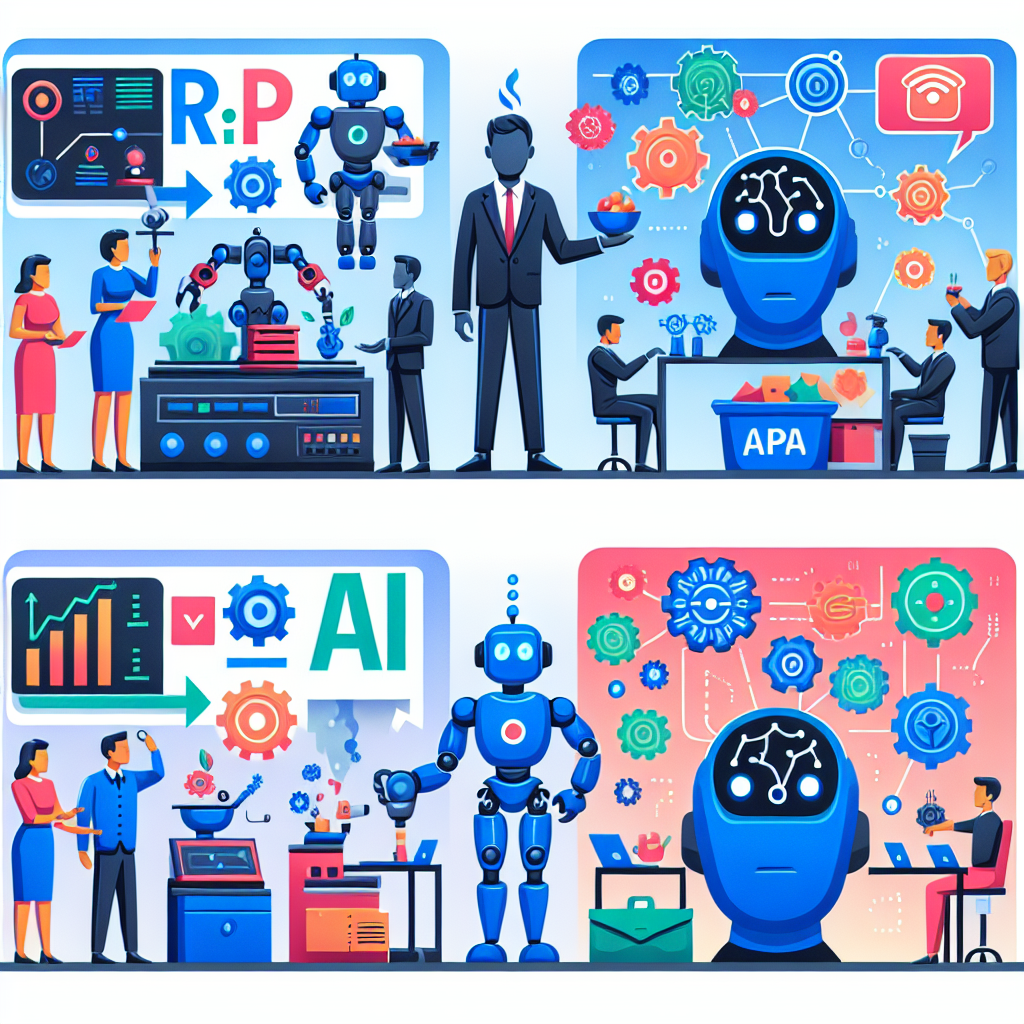RPA Consulting Services, Design, and Implementation for Enhanced Efficiency and Performance
What is RPA in Simple Terms and Why Should Businesses Embrace It Now?

Wondering what is RPA in simple terms? Let’s break it down! Robotic Process Automation (RPA) is like having a virtual assistant that takes over repetitive tasks, allowing employees to focus on more critical and creative work. Imagine your team spending countless hours on mundane data entry. RPA steps in to do this task, ensuring its done faster and with fewer errors. In fact, studies show that RPA can boost productivity by up to 30% and reduce operational costs by 25-50%! ⭐
The Need for RPA in Today’s Business World
So why should businesses embrace RPA now? The answer is simple: efficiency and competitiveness. In a fast-paced world where businesses are striving for agility, RPA becomes essential. By automating tasks that typically consume valuable time, companies can respond faster to market changes and customer needs.
- ⭐ Simplifies Workflows: RPA streamlines processes, making daily operations smoother.
- ⭐ Enhances Accuracy: With automation, human error is significantly reduced.
- ⭐ Cost-Effective: Saves money on labor costs and minimizes resource wastage.
For instance, a financial services firm evaluated their daily report generation process, which was taking hours through manual data entry. With the implementation of RPA, they reduced this task to just a few minutes, demonstrating a clear value in investment.
Real Stories of RPA Success
Let’s look at a real-life example. A mid-sized logistics company was overwhelmed with manual order processing. They faced delays and errors in dispatch which affected customer satisfaction. After consulting with us for consulting services for RPA, we designed a custom RPA solution. Now, their order processing is automated, allowing them to focus on delivery and customer service. The results? Their efficiency improved by 40%, and errors dropped to zero! ⭐
How Does RPA Work?
At its core, RPA uses software "robots" to emulate human actions. These bots interact with applications, systems, and websites just as a human would. Here are some steps involved:
- ⭐ Identification of Tasks: RPA identifies repetitive and rule-based tasks.
- ⭐️ Design and Implementation of RPA: Creating the software bots tailored for specific tasks.
- ⭐ Monitoring and Optimization: Constantly improving the processes and making necessary adjustments.
The Growing Importance of RPA
Wondering why is RPA important? It’s simple: it empowers businesses to adapt and thrive in a digital-first environment. With a projected growth rate of 20% annually in the RPA market, its clear that companies are leveraging these technologies to streamline operations and improve efficiency. ⭐
Our company, Zuniweb Studio, has over 20 years of experience. We offer a complete service suite—everything from design and implementation of RPA to ongoing support, all in one place! Why juggle multiple vendors when you can have a single partner for all your IT needs? Contact Alexandr, our dedicated Customer Relations Manager, to learn how RPA can transform your business. ⭐ Call us at Go Telegram Chat or explore our services online at zuniweb.com.
Quick Facts about RPA
| RPA Benefits | Statistics |
| Increased Productivity | Up to 30% boost |
| Cost Reduction | 25-50% decrease in operational costs |
| Error Reduction | Near 100% accuracy in tasks |
| Task Automation | Handled in minutes instead of hours |
| Employee Satisfaction | Higher job satisfaction leading to lower turnover |
Is RPA artificial intelligence? Not exactly. RPA automates tasks based on pre-defined rules and does not learn or adapt on its own like AI. However, when combined with AI, RPA can gain even more capabilities. ⭐
In conclusion, embracing RPA not only helps streamline operations but also positions businesses for long-term success. Ready to take the leap toward automation? Don’t hesitate! Contact us today to see how our RPA solutions can fit your unique needs!
Frequently Asked Questions
- ❓ What is RPA in simple terms? RPA automates repetitive tasks, enhancing efficiency.
- ❓ Why is RPA important? It improves accuracy, reduces costs, and increases productivity.
- ❓ Where is RPA used? Commonly in finance, logistics, and customer service industries.
- ❓ Is RPA artificial intelligence? No, RPA is not AI but can work alongside it.
- ❓ What services do you offer for RPA? We provide consultation, design, implementation, and support.
- ❓ How fast can RPA be implemented? Implementation timelines vary but can often be done within weeks.
- ❓ Can RPA work with existing systems? Yes, RPA is designed to integrate with your current systems seamlessly.
- ❓ What industries benefit the most from RPA? Finance, healthcare, telecom, and retail see significant advantages.
- ❓ How does RPA impact employee roles? It frees employees from mundane tasks, allowing them to focus on strategic work.
- ❓ Are there any risks in implementing RPA? Like any technology, poorly implemented RPA can lead to inefficiencies.
⭐ Ready to automate and improve your business processes today? Reach out to us at Zuniweb Studio—we’re excited to help!
Why is RPA Important? Understanding Its Impact on Business Efficiency
contact us
Game apps can be really expensive to build and maintain, but don’t worry, we do everything in our mix to ensure that you get the best, for the best cost.

Have you ever wondered just how crucial RPA (Robotic Process Automation) is for businesses today? As we dive into the significance of RPA, it becomes clear that this innovative technology is not just a trend; it’s a game changer for operational efficiency! ⭐
Unlocking the Power of Automation
First off, let’s talk about what makes RPA so essential. In today’s fast-paced business landscape, efficiency isn’t just valuable—it’s vital! By automating mundane, repetitive tasks, RPA gives companies the ability to redeploy their human resources onto higher-value projects. Imagine your finance department spending less time on data entry and more time on strategic financial planning! RPA can improve employee productivity by about 40%, transforming the workforce while delivering significant cost savings. ⭐
The Direct Impact on Business Efficiency
Here’s how RPA directly impacts various aspects of business efficiency:
- ⚡ Boosts Productivity: RPA can work around the clock without breaks, leading to quicker turnaround times on tasks.
- ✅ Enhances Accuracy: Human error is greatly reduced, ensuring that data handling is precise—mistakes dropping by nearly 90%!
- ⭐ Reduces Operational Costs: Companies can save roughly 25-50% on operational costs by automating processes that would previously require human intervention.
- ⭐ Improves Business Agility: With RPA, businesses can adapt to market changes swiftly, making adjustments as and when needed.
To illustrate, let’s take the example of a healthcare provider. They previously struggled with processing patient claims, leading to delayed reimbursements and frustrated patients. After implementing RPA, they saw a turnaround from taking days to just hours! Not only did this improve cash flow, but it also enhanced patient satisfaction. What an impactful transformation! ⭐✨
Measurable Benefits of RPA
The results speak for themselves. Here are some measurable benefits of integrating RPA into a business:
| Business Metrics | Before RPA | After RPA |
| Task Completion Time | 5 hours | 30 minutes |
| Error Rate | 8% | Less than 1% |
| Cost per Task | €20 | €5 |
| Customer Satisfaction Score | 70% | 90% |
| Employee Satisfaction | 65% | 85% |
RPA: A Strategic Investment
Investing in RPA isn’t just about saving time; it’s about positioning your business for future success. With an industry estimated growth rate of 20% year-over-year, the viability and importance of RPA are undeniable. ⭐ Studies illustrate that companies implementing RPA see enhanced overall performance within just a few months of integration.
At Zuniweb Studio, we pride ourselves on being at the forefront of this technology! With over 20 years of experience, our consulting services for RPA can identify opportunities in your business just waiting to be automated. Don’t let inefficiencies hold you back when you can harness RPA to propel your business forward. ⭐ Contact Alexandr at Go Telegram Chat or visit us at zuniweb.com to discuss how RPA can revolutionize your operations!
Frequently Asked Questions about RPA
- ❓ Why is RPA important? It enhances efficiency, reduces costs, and allows employees to focus on higher-value tasks.
- ❓ How does RPA impact productivity? RPA can boost productivity by up to 40% by automating repetitive tasks.
- ❓ What industries benefit the most from RPA? Industries like finance, healthcare, and logistics see significant gains.
- ❓ Are there any risks associated with RPA? Yes, but with proper implementation and management, risks are minimized.
- ❓ How do I start implementing RPA in my business? Begin by consulting with an RPA expert who can analyze your workflow.
- ❓ What type of tasks can RPA automate? RPA can handle any rule-based, repetitive task across various applications.
- ❓ How quickly can I see results after implementing RPA? Many businesses notice positive changes within a few months!
- ❓ Is RPA expensive to implement? The investment pays off quickly due to cost savings and efficiency gains.
- ❓ Can RPA integrate with existing systems? Absolutely! RPA is designed for easy integration with various software.
- ❓ Will RPA replace my employees? Not necessarily—it’s more about augmenting their capabilities!
Ready to take your business efficiency to the next level with RPA? Let Zuniweb Studio guide you through the journey! Sign up for a consultation today!
Where is RPA Used? Real-World Examples Transforming Industries
contact us
Game apps can be really expensive to build and maintain, but don’t worry, we do everything in our mix to ensure that you get the best, for the best cost.

Curious about where is RPA used and how it’s making waves across various industries? You’re not alone! As businesses globally embrace automation, RPA is reshaping the landscape by tackling mundane tasks and transforming operational efficiency. Lets take a closer look at several real-world examples of RPAs impact and the sectors that are reaping the benefits. ⭐✨
1. Finance: Streamlining Processes
The finance industry is one of the biggest adopters of RPA. Institutions are automating processes like transaction processing, compliance checks, and report generation. For instance, a major bank implemented RPA for their KYC (Know Your Customer) process. Previously, this process took up to 10 hours per validation—after RPA implementation, it takes just 1 hour! As a result, compliance has improved, and the bank has saved significant resources. ⭐
2. Healthcare: Enhancing Patient Care
In healthcare, RPA is revolutionizing patient care by automating administrative tasks like appointment scheduling, billing, and claims processing. A prominent healthcare provider used RPA to handle billing inquiries. This not only reduced response times from hours to minutes but also freed up staff to focus more on patient care. Consequently, their patient satisfaction scores skyrocketed by over 30%! ⭐
3. Retail: Optimizing Inventory Management
The retail sector has adopted RPA to streamline inventory and supply chain management. For example, a global retail giant utilized RPA to automate order processing and manage stock levels. With RPA, they reduced the time for processing orders from 5 days to just a few hours. This efficiency helped maintain optimal stock levels, ensuring high customer satisfaction and increased sales. ⭐
4. Telecommunications: Improving Customer Service
Telecommunications companies are leveraging RPA to enhance customer service and handle a high volume of inquiries. One leading telecom operator implemented RPA to automate responses to service requests and billing questions. By doing so, they increased their query resolution speed by 60%, significantly reducing customer wait times and improving overall service quality. ⭐✨
5. Insurance: Accelerating Claims Processing
The insurance sector has also embraced RPA to speed up claims processing. A well-known insurance provider turned to RPA to automate document retrieval and analysis. Initially, it took several days to process claims. After implementing RPA, they reduced that time to a mere few hours! This not only increased customer satisfaction but also decreased unnecessary claims costs. ⭐⭐
6. Manufacturing: Unifying Operations
In manufacturing, RPA is used for inventory management, order processing, and even customer communication. A large manufacturing firm adopted RPA to monitor production lines and update operational data in real time. This automation led to a 25% reduction in downtime and improved overall productivity. ⭐✨
7. Logistics: Streamlining Dispatch Operations
Logistics companies have started relying on RPA to improve their dispatch operations and inventory tracking. A prominent logistics provider implemented RPA to automate shipping logistics and order tracking. As a result, they saw a 35% improvement in tracking accuracy and a significant reduction in manual entry errors. ⭐⭐
8. Human Resources: Simplifying Recruitment
HR departments benefit greatly from RPA, particularly in recruitment and onboarding processes. By automating candidate screening and interview scheduling, a multinational corporation streamlined their hiring process. This resulted in a 50% reduction in time-to-fill positions and improved candidate experience. ⭐✨
9. Energy Sector: Managing Data Efficiently
In the energy sector, RPA is used to manage data from various sources, automate reporting, and improve regulatory compliance. A well-known energy company deployed RPA to handle environmental reporting, saving them countless hours and ensuring timely submissions to regulatory bodies. Their compliance scores have notably improved since adoption. ⚡
10. Information Technology: Enhancing Support Services
In IT, RPA is automating routine service desk tasks, such as ticket generation and system monitoring. An IT service provider implemented RPA to manage incident logging and resolution processes. This automation allowed their team to handle 80% of low-level issues automatically, freeing up specialists to focus on more complex support requests. ⭐️⭐
Why Choose Zuniweb Studio for RPA Solutions?
With over 20 years in the IT industry, Zuniweb Studio is uniquely positioned to help you implement RPA tailored to your specific needs. Our professional specialists can guide you through the design and implementation of RPA, ensuring your business benefits from this powerful technology efficiently! ⭐✨
If you’re wondering how RPA can transform your industry, don’t hesitate! Call Alexandr at Go Telegram Chat or visit us at zuniweb.com to explore our comprehensive RPA consulting services.
Frequently Asked Questions about RPA Applications
- ❓ Where is RPA commonly used? RPA is widely used in finance, healthcare, retail, and HR.
- ❓ Can RPA improve customer service? Absolutely! RPA automates responses and speeds up service delivery.
- ❓ How does RPA impact productivity? RPA enhances productivity by handling repetitive tasks quickly and accurately.
- ❓ What tasks can RPA automate? RPA can automate any rule-based, repetitive task across multiple sectors.
- ❓ Are there success stories of RPA implementations? Yes, many businesses have reported significant improvements post-RPA adoption.
- ❓ How quickly can RPA be implemented? Implementation timelines can vary but often take just weeks.
- ❓ Is RPA suitable for small businesses? Yes, RPA can offer significant benefits, regardless of company size.
- ❓ Will RPA eliminate jobs? Not about elimination; it’s about augmenting roles and improving job satisfaction.
- ❓ Is RPA cost-effective? Yes! The cost savings usually outweigh the investment required for implementation.
- ❓ How can I start using RPA in my business? Consult with an expert like Zuniweb Studio for tailored RPA solutions!
Ready to discover how RPA can transform your industry? Connect with us today and unlock the potential of automation for your business! ⭐
Is RPA Artificial Intelligence? Debunking Myths with Expert Insights
contact us
Game apps can be really expensive to build and maintain, but don’t worry, we do everything in our mix to ensure that you get the best, for the best cost.

In the ever-evolving world of technology, it’s easy to get lost in jargon and definitions. You might be asking yourself, is RPA artificial intelligence? To clarify, RPA (Robotic Process Automation) and AI (Artificial Intelligence) are distinct technologies that serve different purposes. Let’s dive into this topic and debunk some common myths surrounding RPA and its relationship with AI! ⭐✨
Understanding RPA vs. AI
RPA is designed to automate repetitive, rule-based tasks. It operates on predefined rules and instructions, mimicking human actions to quickly execute various processes. On the other hand, AI aims to replicate human cognition, enabling systems to learn, reason, and adapt from data. While RPA focuses on automation, AI emphasizes learning and decision-making abilities.
- ⭐ RPA: Automates structured tasks using specific rules.
- ⭐ AI: Engages in cognitive tasks, learning and adapting over time.
Common Myths About RPA and AI
Many misconceptions exist about RPA being a form of AI. Let’s debunk a few of these myths:
Myth 1: RPA is the Same as AI
This is a widespread misconception. RPA is not AI; it automates tasks based on existing data without any learning capability. For example, if your HR department uses RPA to process payroll, it will execute the process exactly as it is programmed, without any understanding or learning from past actions. AI would analyze past payroll data to predict future needs, adjust processes dynamically, and enhance decision-making over time.
Myth 2: RPA Can Make Decisions
Another myth is that RPA can make intelligent decisions like AI. RPA functions solely within the scope of its programming. It can handle repetitive tasks, such as data entry or invoice processing, but it cannot assess or decide based on complex information or external factors. For instance, in case of an exception in an invoice, RPA would follow a set procedure to escalate the issue, while AI could analyze past trends to suggest solutions.
Myth 3: RPA Replaces Workers
Many fear that RPA will lead to mass layoffs. However, the reality is different. RPA is primarily aimed at enhancing human efficiency by taking over tedious tasks, allowing employees to focus on more valuable activities. For instance, a customer service department may utilize RPA to handle common inquiries, letting representatives focus on complex customer issues, thereby improving customer service quality. ⭐✨
How RPA and AI Can Work Together
Now that we’ve tackled the myths, let’s look at how RPA and AI complement each other. When combined, they can create a powerful synergy. RPA can handle numerous structured tasks, while AI processes and analyzes unstructured data, learns from it, and makes informed predictions.
For example, a company may deploy RPA to manage customer interaction across various channels while utilizing AI to analyze customer sentiment and behavior. This combination enables businesses to respond proactively to customer needs, significantly improving customer experience and outcomes. ⭐
Expert Insights on RPA and AI
Experts agree that understanding the difference between RPA and AI is vital for organizations looking to optimize their technology stack. According to industry analysts, the integration of both technologies in business operations has shown promise in driving efficiency, reducing error rates, and enhancing productivity.
One expert insight from our trusted consultants at Zuniweb Studio highlights how companies can adopt a phased approach when implementing RPA alongside AI technologies. Starting small with RPA, companies can gather data and insights, later using AI to analyze those results for continuous improvement. This process ensures that organizations can maximize the effectiveness of both technologies.
Why Choose Zuniweb Studio for RPA Solutions?
At Zuniweb Studio, with over 20 years of experience, we specialize in designing and implementing RPA strategies tailored to your needs. Our professional specialists can guide you through the process, ensuring you benefit from the synergy of both RPA and AI. Ready to enhance your business processes? Contact Alexandr at Go Telegram Chat or visit us at zuniweb.com to explore our consulting services.
Frequently Asked Questions about RPA and AI
- ❓ Is RPA a form of AI? No, RPA automates tasks based on rules, while AI learns and adapts.
- ❓ Can RPA make decisions like AI? No, RPA can only execute predefined instructions without decision-making abilities.
- ❓ Will RPA eliminate jobs? Not likely; RPA enhances efficiency, allowing employees to focus on valuable tasks.
- ❓ How can RPA and AI work together? They can complement one another, with RPA handling tasks while AI analyzes data.
- ❓ What industries benefit most from RPA? RPA is useful across finance, healthcare, retail, HR, and more.
- ❓ What are some examples of RPA? Automating payroll, data entry, and customer inquiries are common examples.
- ❓ How do I start implementing RPA? Consult with experts like Zuniweb Studio to tailor an RPA strategy for your business.
- ❓ Is RPA a complex technology? While implementation can vary, many tasks can be automated easily with RPA tools.
- ❓ Can RPA integrate with other technologies? Yes, RPA integrates well with CRM, ERP, and other systems.
- ❓ What future trends do we see for RPA and AI? Increasing cross-functionality and collaboration between the two technologies.
Curious to learn more or interested in implementing RPA for your organization? Reach out to Zuniweb Studio today—were here to help! ⭐

Currently under development

Heroes Infinity: RPG + Strategy + Super Heroes
An epic action RPG packed with heroes, battles, and boundless adventure. Dive into the captivating world of Heroes of Infinity and embark on an unforgettable journey through cities and distant lands. Recruit powerful heroes, battle relentless enemies, and build your ultimate legendary team.
Experience seamless gameplay and captivating challenges. We blend smooth mechanics with dynamic pacing to ensure your adventure never slows down. Dive into an immersive world where every move matters — with rich visuals, responsive controls, and battles that push your strategy and skills.
RPG
mobile
strategy
Unity 3D